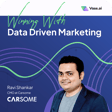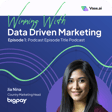
Solve Business Problems with Data Analytics: A Case Study from OMD and McDonald’s | Ranga Somanathan
Hosted by Julie from Vase.ai Market Research. In this episode, we have a special guest, Ranga Somanathan, a marketing and communication veteran with over 20 years of experience in helping clients from various sectors with their growth and innovation agendas. As ex-CEO of Omnicom Media Group across Malaysia & Singapore, and now the co-founder and curator of RSquared Global Ventures, a company that connects startups, corporates, and investors, Ranga is sharing valuable insights in our podcast where ...
1/ You will learn how Ranga and his team at OMD Singapore used data analytics to solve a business problem for McDonald’s online delivery service, and how they created a win-win situation for all stakeholders by balancing the demand and supply using search data and kitchen data.
2/ You will discover the importance of market mix modeling and data-driven strategies for marketers, and how they can help you understand the impact of various input variables on sales and business outcomes.
3/ You will find out why companies who seemingly successful without data-driven strategies should leverage data before it’s too late, especially in the Southeast Asia region where the market may face headwinds and softening in some sectors due to macroeconomic and geopolitical factors. You will also get some recommendations on how to build a data-driven culture and mindset in your organization.
In today’s episode, we discuss :
- Introduction
- Ranga’s background and journey in marketing
- How to drive effective advertising strategies by starting with a business problem (not a marketing problem)
- Case Study: How OMD & McDonald's solve an operational problem with a marketing solution
- Importance of using Market Mix Modelling to drive effective marketing strategies
- Why companies who are seemingly successful without data-driven strategies should leverage data before it's too late
- Tips for beginner, intermediary & advanced companies who wanted to start leveraging data in their marketing strategies
- Role and potential of generative AI for marketers
- How to define success metrics in marketing via Mind Measures & Operational Measures
- The importance of understanding the WHY consumer buys behind the WHAT consumer buy & how panel research can help close that gap
- Best practice of questionnaire design to get the right research data
- Ranga advises marketers to have empathy, risk-taking & financial accountability
- Recommended book for marketers
- How to connect with Ranga
Don’t miss this insightful episode and inspiring conversation with Ranga. Tune in now and learn how to use data to power your marketing and business.







